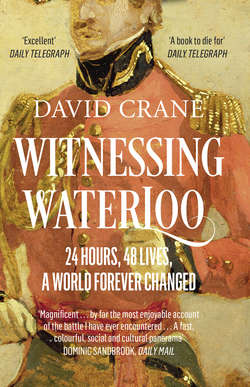Читать книгу Witnessing Waterloo: 24 Hours, 48 Lives, A World Forever Changed - David Crane - Страница 19
7 a.m.
ОглавлениеLe Loup de Mer
On the south side of the Thames, at the junction of Southwark’s Borough Road and Blackman Street, Thomas Cochrane was beginning the last forty-eight hours of his year-long sentence in one of the sadder curiosities of early nineteenth-century London. A few hundred yards to the north-west a great gallows beam high on the roof marked the entrance to Horsemonger Lane’s Surrey gaol, but King’s Bench prison dealt only in the small change of human misery and humiliation – in the debtors and bankrupts and their wives and children who lived here on the crumbling edges of society and on whatever their friends and families could provide to keep life and soul together.
A cell in the King’s Bench – fifteen feet by ten and containing three beds – was the first room that Leigh Hunt could recall and its barrack-like corridors, filled with the laments ‘of aged and unhappy parents’ and weeping wives, his earliest introduction to the geography of London. Less than half a mile to the north, Dickens’s Marshalsea might provide copy for a lifetime of shame, but if one was looking for a genuine microcosm of the world’s greatest metropolis, a sink for all the deluded hopes, aspirations and ambitions that a voracious, commercial and imperial capital generated and disappointed, then the King’s Bench and its floating and permanent population of debtors was the place.
It was not like Newgate to the north of the river, nor Horsemonger Lane, nor even the Marshalsea, and with its spacious parade and its speciously handsome Georgian buildings, its tap rooms, coffee house, marketplace and games of rackets, its atmosphere lay somewhere between an open prison, a refuge centre and a college for which the only entry qualifications were failure and ill-fortune. For the payment of a fee a debtor could enjoy the freedom of the prison ‘Rules’, an area of three square miles surrounding the gaol; but the immense spike-topped wall was a reminder that when night fell, and the last visitor had left and the only sounds were the cries of ailing babies, and the only view that of a blind wall just feet away, the King’s Bench was still a prison.
Sometime in the middle hours of a March night three months earlier, when the watchman was at the farthest point of his prison rounds, a prisoner had paused in the window of his fourth-storey room with a length of rope looped around him and another shorter length in his hand. The fourth floor of the building was almost on a level with the top of the prison wall, and for a sailor in the prime of life a moment’s work was enough to throw a running noose over a spike, and another to swing his six-foot-two-inch frame out of the window and, hand-over-hand, across the twelve-foot gap between sill and outer wall.
The prison wall was thirty-five feet high, and the narrow well beneath pitch-black, but once across he hauled himself on to the top and perched precariously between spikes while he secured the second rope to the ironwork. He had arranged with an old servant of his a safe house somewhere in the shadow of the prison wall below him, and had lowered himself nearly halfway down when his makeshift rope, smuggled into the prison in pieces, snapped and sent him crashing the last twenty feet to the ground.
The bruised and unconscious escapee was Thomas Cochrane, better known as Lord Cochrane, demagogue rabble-rouser, inventor, Member of Parliament, heir to the 9th Earl of Dundonald, and the most brilliant, ungovernable and imaginative naval captain the Revolutionary and Napoleonic Wars had produced. In the previous August, Cochrane had been sentenced to the stocks, a £1,000 fine and a year in the King’s Bench on a charge of fraud, but his troubles with the authorities had really started – if they did not start with his birth – on an April day five years earlier when he had joined Frederick Maitland and the rest of Admiral Gambier’s blockading force keeping an enemy fleet bound for the West Indies bottled up close to Rochefort in the inner Aix Road.
Cochrane knew these coastal waters and shore defences intimately, and with a record for courage and unorthodoxy that stretched back to the first years of the war, had been despatched by the Admiralty in the Imperieuse to mastermind a fireship attack on the French fleet. As a junior captain he knew well enough that his arrival would ruffle the feathers of the more senior captains in the fleet, but for once in his turbulent life he had the authority of the Admiralty behind him, and on the night of 11 June a mixed flotilla of fireships and bomb-vessels under his command had slipped off into the dark of a moonless night towards the coast and the double lines of the French fleet anchored under the guns of the Ile d’Aix.
